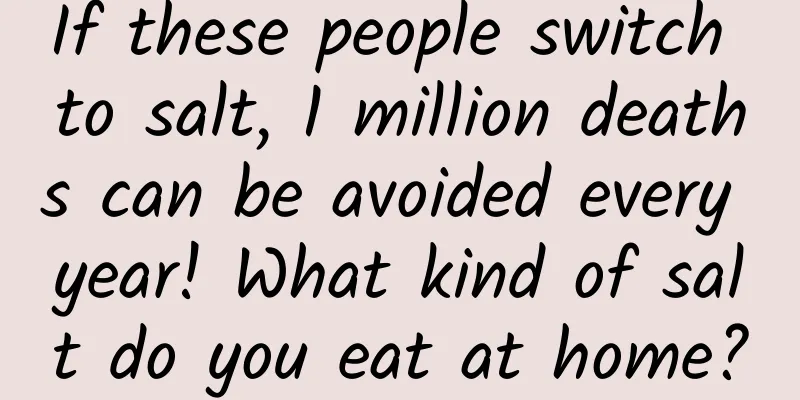If these people switch to salt, 1 million deaths can be avoided every year! What kind of salt do you eat at home?

|
According to the report of World Salt Reduction Week 2022, the number of deaths due to high-salt diet worldwide reached 3 million in 2017, and the number of deaths in my country reached 1.65 million. Especially for those who usually eat too much salt, have strong tastes, and have high blood pressure, in fact, just by changing a kind of salt, this problem can be avoided to a large extent. Salt is an essential condiment in the kitchen, which can provide saltiness. Cooking without salt would be "tasteless and a pity to throw away." Although salt plays an essential role in food, the more the better is not necessarily true. Eating too much salt will increase many health risks, such as the well-known high blood pressure, stroke, etc. In fact, the harm caused by a high-salt diet is not limited to these, there are many more. In this article, we will discuss the specific effects of a high-salt diet on health one by one. In addition, I will tell you about several common types of salt on the market and how we should choose them in our daily lives. 01 The dangers of a high-salt diet A high-salt diet is the "real culprit behind the scenes" that causes many deaths. Everyone knows that eating too much salt can lead to high blood pressure, but few people know that high blood pressure is related to deaths from many chronic diseases. Don't underestimate high blood pressure. Severe high blood pressure can cause a series of physical problems, such as damage to the heart, brain, and kidneys. Copyright image, no permission to reprint Patients with malignant hypertension may develop kidney failure or even death within a short period of time. Currently, the prevalence of hypertension in my country is increasing year by year, and the incidence and mortality of cardiovascular diseases are both on the rise and are becoming younger. [1] Controlling blood pressure can effectively reduce the occurrence of cardiovascular and cerebrovascular diseases and the risk of death. To control blood pressure, changing high-salt eating habits is of paramount importance. 02 In addition to high blood pressure, what other dangers are there? 1. Makes you more susceptible to fractures Fractures are not only caused by "insufficient calcium intake". Excessive salt intake in the diet can also increase the risk of fractures. Eating more salt means taking in more sodium ions, and high sodium will inhibit the differentiation and function of osteoblasts. Osteoblasts specifically secrete a variety of bioactive substances to regulate bone formation and promote bone growth. Animal experiments have shown that a high-salt diet can reduce bone density and strength in rats and increase the risk of fractures[2]. Fractures are not a trivial matter and can even be life-threatening for elderly people. 2. Increased risk of gastritis The occurrence of gastritis is closely related to a high-salt diet. Excessive salt intake can irritate the gastric mucosa and may cause the gastric parietal cells to detach[3]. Parietal cells are a barrier that protects the health of the stomach. Once they are destroyed, the risk of gastritis increases, and in severe cases, may even lead to gastric cancer. 3. Impact on cognitive ability A high-salt diet may impair certain cognitive functions of the brain, according to new research. Long-term high salt intake will lead to increased oxidative stress in the hippocampus and inflammatory responses originating from the intestine, and impaired memory, especially for the elderly[4]. Copyright image, no permission to reprint In addition, even if there is no abnormality in blood pressure at present, if you continue to eat a high-salt diet, it will also damage cognitive function. In order to avoid the various harms caused by excessive salt intake, salt control is imperative! 03 How to choose different salts? There are many types of salt on the market, which can be roughly divided into three categories: low-sodium salt, iodized salt, and non-iodized salt. 1. Low sodium salt To prevent the harm caused by a high-salt diet, the most important thing to do is to control sodium intake. Excessive sodium intake is the main factor leading to high blood pressure. Long-term excessive intake of NaCl can damage endothelial function, affect vasodilation activity, and lead to high blood pressure. [5] Low-sodium salt uses a portion of potassium chloride instead of sodium chloride. The saltiness is almost the same as that of ordinary table salt, does not affect the taste, and has good compliance. Figure: QB/T 2019-2020 Low Sodium Salt Low-sodium salt provides the body with a high-potassium, low-sodium environment, which helps reverse endothelial dysfunction, softens blood vessels, relaxes vascular smooth muscle, helps lower blood pressure, and protects blood vessels. [5] Other studies have shown that compared with a control group using regular table salt, the intervention group using low-sodium salt had a 14% reduction in fatal and non-fatal stroke, a 13% reduction in major adverse cardiovascular events, and a 12% reduction in all-cause mortality. [1] According to statistics, if ordinary salt in home kitchens, restaurants, canteens, food companies, etc. were replaced with low-sodium salt, the death rate in China would be reduced by more than 10%. According to the latest statistics, my country's total population in 2020 was 1.412 billion, with a mortality rate of 7.07‰. Roughly speaking, this will reduce the number of deaths by about 1 million. [1] Therefore, for people who usually eat too much salt, have strong tastes, and have high blood pressure, low-sodium salt can be used instead of ordinary table salt. However, people who work in high temperatures, do heavy physical labor, certain people with kidney disease, patients with uremia, etc. should be cautious when consuming low-sodium salt. 2. Iodized Salt At present, people in most parts of my country eat iodized salt, which is to prevent goiter caused by iodine deficiency. In the 1970s, there were nearly 35 million patients with endemic goiter and 250,000 patients with endemic cretinism in my country.[6] These figures are still very large. In order to reduce the incidence of iodine deficiency, my country began to promote iodized salt in 1995. Since then, the prevalence of goiter has been significantly controlled. Iodine is an essential trace element for the human body and an important raw material for synthesizing thyroid hormones to maintain human health. Copyright image, no permission to reprint The Chinese dietary iodine reference intake recommends that the average adult consume 120 micrograms per day. In most areas of my country, the amount of iodine that can be obtained from drinking water every day is about 10 micrograms; 25 to 50 micrograms can be ingested through food, which is still far from the recommended intake of 120 micrograms. Iodized salt can fill this gap very well. According to my country's "Iodine Content of Edible Salt" standard, if the iodine level of salt is fortified to 25 mg/kg, and in accordance with the recommendations of the "Dietary Guidelines for Chinese Residents", a maximum of 5g of salt should be consumed per day. If the cooking loss rate is calculated based on the 20% recommended by WHO and other international organizations, then 100 micrograms of iodine can be consumed from iodized salt every day. [6] In this way, the iodine intake from food plus the iodine provided by iodized salt can easily reach 120 micrograms/day. If you don't eat iodized salt, it means that most people will face the risk of iodine deficiency. Therefore, it is necessary to eat iodized salt in iodine-deficient areas. Even if you live in coastal areas, you still need to eat iodized salt. Although foods such as kelp and seaweed in coastal areas are rich in iodine, local residents consume them less frequently and in lower amounts, so they still need to consume iodized salt to supplement the recommended amount. [6] In addition, patients with Hashimoto's thyroiditis should appropriately limit their iodine intake. They can also eat iodized salt, but they need to appropriately limit the intake of iodine-rich foods such as kelp, seaweed, and nori. Things to note about the storage of iodized salt:[7] Try to buy small packages and eat them as soon as you buy them to avoid leaving them for too long, which may affect the iodine supplementation effect. Buy iodized salt with the iodized salt logo from regular supermarkets. Image source: e-commerce platform Pour into a covered container and store in a cool, dark, dry place, away from the stove as far as possible; When cooking, add salt when serving to minimize losses; Do not fry iodized salt with oil, as high temperature will increase the volatilization of iodine; 3. Non-iodized salt Although people in most parts of our country need to eat iodized salt, residents living in areas with high iodine content in water sources do not need to eat iodized salt and can just eat non-iodized salt. The iodine content in drinking water in areas with high iodine content is relatively high, generally >100μg/L. As long as you eat normally and drink 1000 ml of water, your iodine intake will reach the recommended amount. These areas are mainly distributed in Tianjin, Hebei, Shandong, Jiangsu, Anhui, Henan, Shanxi and other provinces, cities and counties. [6] In areas that have been identified as areas with high iodine content in water sources, the salt supplied on the market is generally non-iodized salt. In addition, non-iodized salt is also suitable for patients with hyperthyroidism and some thyroid tumors. However, not all thyroid diseases require eating iodine-free salt. You should follow the doctor's advice based on your own situation. In addition to these salts, there are also bamboo salt, sea salt, lake salt, rock salt and other salts on the market, which all refer to the origin of the salt; There are also rose salt, lemon salt, etc., which are just different in color or flavor. These salts have no special functions, and some are even more expensive. Summarize: Eating salt is important, but eating the right salt is more important. Those who should eat iodized salt should not replace it with non-iodized salt without permission. Hypertensive patients who usually eat too much salt and have strong tastes can replace ordinary table salt with low-sodium salt, which is more beneficial to their health. References: [1] Wu Yangfeng. Scientific evidence and public health significance of promoting low sodium salt[J]. Chinese Journal of Circulation, 2022, 37(01): 1-3. [2] Yang Junxian, Li Qingnan. Relationship between high sodium intake and osteoporosis. Chinese Journal of Osteoporosis and Bone Mineral Diseases, 2017, 10(03): 306-310. [3]Xu Hairong, Xu Yaochu. Recent epidemiological studies on the relationship between dietary factors and gastric cancer. Chinese Oncology, 2002(02):21-23. [4] Michael DK, Margaret JM. Reviewing the effects of dietary salt on cognition: mechanisms and future directions. Asia Pac J Clin Nutr, 2019, 28(1):6-14. [5] Lü Xiaojuan, Ma Wenjun. Research progress on the relationship between low sodium and hypertension[J]. South China Journal of Preventive Medicine, 2014, 40(04): 355-358. DOI: 10.13217/j.scjpm.2014.0355. [6] Iodine Supplementation Guidelines for Chinese Residents [7] Chinese Nutrition Society. Dietary Guidelines for Chinese Residents[M]. People's Medical Publishing House. 2022 Author: Xue Qingxin Member of Chinese Nutrition Society Registered Nutritionist Health Manager Public Nutritionist Review | Gao Chao, Associate Researcher, Institute of Nutrition and Health, Chinese Center for Disease Control and Prevention The cover image and the images in this article are from the copyright library Reproduction of image content is not authorized |
Recommend
67 wild red pandas, each costing RMB 350,000. Who is paying for the poaching?
67 wild red pandas, each costing RMB 350,000. Who...
Detailed tutorial on Red V certification on Xiaohongshu
In the past, bloggers often asked me how to get t...
Can frozen steamed bread be eaten after more than two days? The scientific truth behind the fact that aflatoxin is nearly 70 times greater than arsenic
Recently, a short video claiming that "Zheji...
Some people really can't cough up phlegm! Do you know how harmful it is to swallow it?
Cough cough cough, heh~TUI! Wait, don’t be so dis...
Why is altitude sickness fatal?
Why do people need oxygen? If oxygen inhalation i...
A world first! Good news for millions of paralyzed people: 3D artificial spinal cord cures paralyzed mice
Written by: Zhu Hengheng Editor: Wang Haha Layout...
Are crab sticks really the meat that falls off the crab? Should the plastic film on the surface be cooked together?
Winter is coming How can we miss hotpot? After a ...
Practical application of Internet finance: Who touched your promotion fees?
If you are attracting new customers for an Intern...
Kuaishou short video promotion skills and operation ideas
The predecessor of Kuaishou, called "GIF Kua...
Dual-line server hosting improves network access speed
Computer network is an indispensable thing for us...
Microsoft's win10 and its black technology
Editor's note: Can the release of Windows 10 ...
Let's talk about the operating thinking and skills of 10 yuan
Today let’s talk about the 10-yuan operational th...
There are cracks in human nature - 52 psychological lessons to understand personality
Jane Lili Jian Lili, former lecturer and psycholo...
How did people open cans when there were no cans?
Why not just change the name of the can to the di...
Online marketing promotion: How to use H5 activities for brand promotion!
An H5 product needs to be carefully polished, but...









